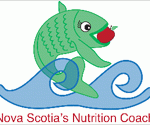by Krissy Adams-Schofield, PtD, PTS, BScAHN
 In my last entry I featured an article on the importance of weight training; this entry my topic will be on the importance of nutrition in helping you achieve your health and fitness goals. How important is nutrition in health and weight loss you ask? The answer is extremely important! In fact proper nutrition comprises at least 80% of the factors involved in weight loss, the other 20% being exercise and genetics. Now that doesn’t mean that you don’t have to workout as well. You do! However, you can exercise until you are blue in the face but if you do not follow a healthy eating plan in conjunction with exercise then you WILL NOT see the results you want. That being said eating only salads and cutting out meals is not proper nutrition either. So what then comprises a healthy eating plan for both weight loss and overall health? Read below for a few significant factors everyone should include in their daily nutrition.
In my last entry I featured an article on the importance of weight training; this entry my topic will be on the importance of nutrition in helping you achieve your health and fitness goals. How important is nutrition in health and weight loss you ask? The answer is extremely important! In fact proper nutrition comprises at least 80% of the factors involved in weight loss, the other 20% being exercise and genetics. Now that doesn’t mean that you don’t have to workout as well. You do! However, you can exercise until you are blue in the face but if you do not follow a healthy eating plan in conjunction with exercise then you WILL NOT see the results you want. That being said eating only salads and cutting out meals is not proper nutrition either. So what then comprises a healthy eating plan for both weight loss and overall health? Read below for a few significant factors everyone should include in their daily nutrition.
1) Eating enough food! – That’s right, you need to eat enough to lose weight! What great news! Surprisingly this is the biggest mistake I see people make when they first come to me. Often times the initial reaction people have when they want to lose weigh is to cut out food or meals. This actually has the opposite effect and may lead to further weight gain or seeing no results. When you do not eat enough food your body thinks you are starving it, so it actually holds onto all of the fat you have because it doesn’t know when you will be eating again. Trust me, you don’t want this so never skip meals!
2) Timing – Just like eating enough food is important so is the timing of your meals and snacks. When you wait too long between meals you actually slow your metabolism down and make it that much harder to lose fat. To ensure your metabolism is functioning at its maximal fat burning capacity you should be eating every 2 – 3 hours for a total of 5 – 6 times a day. Waiting longer than this can also cause you to store fat, and may lead to overeating later (aka you feel like eating everything in sight once you’ve realized you haven’t eaten all day). Timing is also crucial for energy levels and eating regular small meals/snacks helps keep you going throughout your day.
3) Balance – Of course what you eat is also very important in helping you achieve your goals and ensures you are getting all of the essential nutrients your body needs for overall health. Each meal/snack you have should have a balance of complex carbohydrates (whole grains, fruit, or vegetables), lean protein (found in dairy, lean meat, fish, eggs, nuts, seeds, legumes, or soy products), as well as a moderate amount of healthy fat. Each nutrient plays a significant role for both fat loss and health.
4) Portions – Portion control is also significant in helping you reach your goals, as there is such thing as eating too much of a good thing. You should follow the portion guide outlined in Canada’s Food Guide to ensure you are not only getting all of your required portions for the day but that you are not overeating. Larger portions mean higher calories, no matter what the food, and can hinder your weight/fat loss results.
Of course there are countless other important factors that should be considered in a healthy eating plan such as limiting sugar, saturated/trans fat, alcohol and sodium, and drinking enough fluids. For more tips on nutrition and following a healthy plan please visit my website at www.krissyadams.com.
Components to achieving fat/weight loss (part 1)
Components to achieving fat/weight loss (part 3)
Filed under: Fitness, Healthy Living, Nutrition






